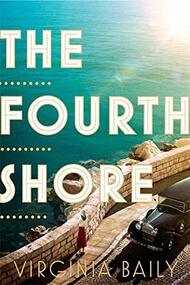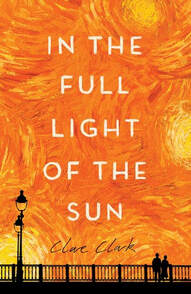The Fourth Shore by Virginia Baily
She doesn’t even realise that it’s his opposition to black-and-white politics that has taken her beloved older brother, Stefano, to the Italian colony of Tripoliana, along the Libyan coast. All she knows is that life is dull without him and, when he’s saved up the money, and their parents agree to let her go, she jumps at the chance to join him.
Befriended by a glamorous socialite on the voyage across the Mediterranean, Liliana has high hopes of mingling with the smart expatriate set. But her brother has married a Bedouin woman whom he wants Liliana to Italianise, without acknowledging that a cultural exchange must work both ways. As Liliana gradually warms to her sister-in-law, she keeps one foot dangerously in the opposite camp, through a liaison with the colonel she met at a party in Rome the night before they set sail.
Five decades later, Liliana is newly widowed in London, having excised her Italian past. But a newspaper report, and an unexpected windfall, sends her back to Rome and her fragmented memories to confront the tragedy of her youth.
While this strand, set in 1980, serves up the heroine’s elixir of redemption, I found the foreshadowing of the mystery a little heavy-handed, but felt the historical strand could easily have carried the novel on its own. Knowing next to nothing about the Italian occupation of Libya, I was fascinated and appalled. Liliana – naive, idealistic and desperate for love – is perfectly placed to highlight the cruelty and corruption of the regime, and the lengths that many of us will go to in order to justify the behaviour of those on whom we depend. Technically, for writers like me still grappling with how to build jeopardy without compromising credibility, it illustrates how the right character can create the plot.
A great addition to my recent reading on fascism – for example Deviation – and on colonialism – for example The Old Drift – Virginia Baily’s second novel is published by Fleet. Thanks to them for my review copy.
In the Full Light of the Sun by Clare Clark
Berlin almost a century ago: a tolerant city where artists bask in the full light of the sun. Where forbidden love can sparkle, confident the authorities will continue to turn a blind eye, and where van Gogh is gaining the celebrity he never had when he was alive.
Julius, a wealthy art critic and author of a bestselling book on the Dutch painter, has finally accepted that his marriage to a woman half his age has come to an end. His wife has fled to her parents along with their baby son and the van Gogh painting he’s loved longer and more than either of them. Around the same time, Matthias, a mercurial art dealer, consults him about a painting’s authenticity, and Julius, with a gap in his life to fill, takes him under his wing.
Emmeline, the daughter of a woman he met at a house party, is also a talented painter, but Julius is reluctant to take her side. When Matthias acts as a go-between, he serves his own interests more than either of theirs. All three are dragged into – or complicit in – a scandal involving possible forgeries. Frank is the lawyer engaged for the defence.
In her sixth novel, Clare Clark has drawn upon real-life events in mapping this intriguing tale of vested interests in the art world, whose politics would be sufficiently gripping alone. But this also takes place within a terrifying period of national politics, as Germans live through crippling hyperinflation into the pseudo-stability of fascism, and the scapegoating of the people at the centre of Berlin’s beating heart.
The novel is structured in linear time over around a decade, with three sections, each focusing on a main character in turn, with Matthias the common thread. While Julius is vulnerable under the Nazis because of some distant Jewish heritage, and Emmeline because she loves another girl, I found the lawyer Frank’s account, structured as a diary, the most poignant. He and his wife have already lost so much; now he’s heading to lose his right to earn his living and potentially the right to life.
I’ve read a few fictional accounts of the collective madness of Nazism and In the Full Light of the Sun is up there with the best. With Frank in particular, Clare Clark perfectly evokes that mentality of denial and delusion as a defence against paranoia: who would believe that civilisation was unravelling, that the attacks on ordinary people’s existence would only get worse? Who wouldn’t hang onto the life they know until it was too late? The precise, yet understated, way the author portrays this makes In the Full Light of the Sun one of my five-star favourites. Thanks to publishers Virago for my review copy.
For another novel about van Gogh, see Let Me Tell You about a Man I Knew. For another pitch-perfect rendition of life under the Nazis, see my review of A Boy in Winter. As my elixir is truth, I’ve also drawn on this painful theme in my writing, as in the shortest story in my collection, “Communal Shower”. Sadly, the politics of intolerance and mutually-assured destruction feel all too relevant today.
























 RSS Feed
RSS Feed





















